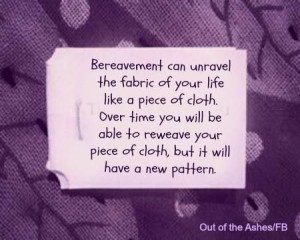Go on any PTSD or mental health website and you will find varying definitions of trauma:
– an emotional shock reaction to a disturbing event
– anything that is deemed non-nurturing
– debilitating symptoms as a result of a life-threatening or emotionally overwhelming experience.
Surviving trauma means different things to different people.
The numbing effect we feel after trauma (the body’s way of protecting us from feeling too much too quickly) may sometimes last a very long time. When bereavement accompanies a trauma, there is the possibility of complicated grief or prolonged grief. Grief and trauma combined affects us more than either one alone.
Here are some things to consider if you or someone you know is experiencing traumatic grief:
- Sensations associated with the trauma (sirens, loud noises, etc.) will trigger memories of the event.
- Feelings of safety and predictability will be compromised – even when undertaking “normal” activities like shopping or going to appointments. Be mindful of when you are avoiding activities and people and staying in your home (try and stay connected as much as possible.)
- A sense of hopelessness about the future may develop, as the trauma survivor may feel somehow targeted or singled out. If you have experienced previous trauma in your life, those feelings will also rise to the surface.
- If there are questions surrounding the death (i.e. how much a person suffered) the bereaved person may imagine the worst.
- A full level of understanding surrounding the death may never be achieved.
- Unlike some end-of-life circumstances, there was no chance to say goodbye.
Developing strategies to manage triggers and feeling unsafe and anxious will help:
- Seek out support, emotionally and socially, from friends and family. Others often don’t know the right things to say or how to help during times like these so be sure to ask for what you need.
- When you feel ready, appropriate details and information surrounding the death may help with understanding.
- Understand that people process grief differently, some by talking and others by distraction; there is no “right” way.
- You may require help resetting your body and brain chemistry by taking medications. See a doctor to determine your best course of treatment. Anxiety & Stress Symptoms Chart
- Children are perceptive and susceptible to the grief reactions of adults (especially parents.) Get help from professionals if you or others are troubled by continuing thoughts of shame, blame, or survivor’s guilt (a family doctor is a good place to start.)
- Mementos and rituals can help to create a sense of hope for the future. Thinking of meaningful ways to honour the people who have died will pay tribute to their lives and help you express your feelings.
Through all of the emotional turmoil and upheaval your own life course will now be on, realize that feelings of grief are a reflection of love.



